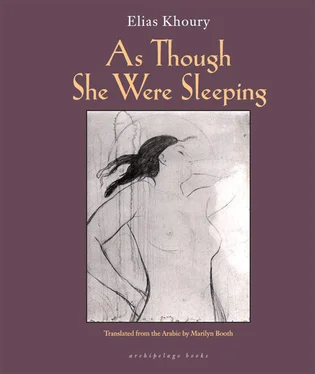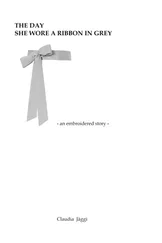And so now Mansour enters his own story, beside the deathbed as a brother’s tears run across a brother’s cheeks.
Mansour did not cry. Milia does not know where the story of the tears on the brother’s cheeks came from. She was there and saw no tears. But there had to be some beginning to the story. She told him she was becoming afraid of his story. She told him she had seen how everything in him had altered. Mansour had come to look like his brother: it was not so much that the man had changed but that he had stripped himself away and donned a wholly new image. The poetry disappeared. Erased as well was the giddy passion that had captured his eyes whenever he gazed at the soft pale angelic face that filled out with bashfulness and went pink with desire — that vision of which he never got his fill. But now, everything went dry. Even that thing of which Milia had never spoken, never in all her life, vanished; the flow of it dried up. He would sleep with her, and as usual she would not be awake, but still she did not sense the quiet eruption of waters from deep inside the earth that resided quietly inside of her. As though he were not himself.
When they returned from Jaffa she discovered that the man who had come to her in Beirut in flight from his own story had fallen into the story written for him by the hand of fate. The fisher of tales had triumphed in impaling him. His brother was dead and there remained no alternative before the trader in cloth who had dreamt of transforming himself into a silk merchant, because, as the proverb goes, If it’s a lover you are, the silk trade takes you far. The eternal lover who sips from the water of his beloved’s eyes day after day (as Mansour called himself) fled to cloth and to Beirut because he sensed there was no future for this miserable country where the prophets’ presences had led to so many disasters. He knew that his brother had done his utmost but that Jaffa could not sustain it. I know them, and I told Amin. We cannot do it, Mansour told his wife. But Amin said, simply, It is our homeland. Mansour knew that Amin had right on his side; he knew that the business the two of them had inherited from their father must be at the service of those defending the threatened city.
How can you say that? Amin had continued, challenging his brother. At least we make cartridges and repair rifles. Are you saying we should just let the Jews take the place and push us out?
This issue had provoked Mansour’s departure. No, I’m not a coward but I don’t like weapons. You and Mother are right about this — but personally, I can’t do it.
But then how are we to fight the English and the Jews? With words and stories, or by making things we can really use?
He told his brother he could not do it, and he went off to Beirut. There he fell in love with the Lebanese woman. The thought did pass through his head that staying in Beirut might mean an easier life. That proved impossible, though, and so he opened the little boutique in Nazareth. Traveling to Beirut to procure the new European fabrics became an essential part of his life, and that’s how it all unfolded. His heart fell into captivity at the Shahin family garden. This, he said, was the beginning.
But the true beginning awaited him in Nazareth. There — and as he contemplated the apple of life, which was the name he had given to his wife’s swollen belly — the news came that overturned everything, announcing the end of life in Nazareth and the imperative of moving the little family to Jaffa.
But — the dream, said Milia.
Instead of smiling at her dream as he had always done, Mansour’s face was all frowns. She did not understand the meaning of what was happening, he snapped.
But, the dream, it was the dream, she told him. She reminded him of the goblet he had broken. He said it had not been as she said. You were talking about a wine goblet, he said, but all I saw was an ordinary glass. It fell and broke. Now please, let’s get on with packing our bags and getting out of here — no more of these silly tales!
Milia persisted. Musa drank the wine, she told him, and the splinters from the shattered goblet, strewn across the floor, were shot through with light. But when she knelt down to –
Enough! Mansour barked. Milia froze. That word — Enough! — was more than enough for her; it rendered her speechless. She recognized immediately that henceforth she must reckon with a new and wholly unknown man.
A woman does not marry one man alone in her life, Hasiba had said. If anyone tells you she does, they’re lying. The Salim whom Hasiba had married was not the Salim who came down with the mumps. And then, Salim the invalid was still another man. Nor was he the Salim who recovered and then became obsessed with the problems in his “little brother,” which occupied his wandering eye. That Salim of the wandering eye was not the Salim who was the lover of Maryam. The lover of the Egyptian whore was not the man who bought the house and dragged the family there after the late lamented’s death. The latter Salim was not the same man who had intended to kill his son with a rock. And then, the supposed killer of his son was someone other than the man lying on the ground who was carried off somewhere unknown by the coma that felled him. I married a whole gang of men, she said, and every so often I’ve had to get used to a new one. I’m tired out. Son, let me die. That would be so much easier.
These were Hasiba’s words to Yusuf when he found her sitting alone in the dirt lane beneath the carob tree. Hasiba had left the house, in her long black gown, as she always did in the evening, to stride the nighttime streets. But she did not come back. Yusuf went in search of her. He circled all the streets near the house before fatigue took over and he nearly went home, but then he found himself in front of his mother under the carob tree. He launched immediately into a scolding but her faint voice stopped him. She seemed unable to rise from the ground. She told him she could not get up and when he took her hand he realized how weak and trembly her muscles were.
What’s the matter, Mama? Come on now, get up.
What Hasiba had to say about her husband, about how many times she had married him or how many husbands she had married, were the last words she ever said that made any sense. Yusuf tugged at her arm to get her up but she dwindled away in his arms.
What’s happened, Mama? Will you tell me?
Yusuf saw tears on the white face shadowed by so many wrinkles. He bent over the woman, folded her carefully at her middle, and hoisted her onto his shoulder. She was as light as a feather. Tall beautiful fierce Hasiba was no more now than a collection of bones held loosely together. Her body had withered away, and now the woman was like a tiny light sparrow without wings.
He hoisted her and walked. He knew he was taking her to her death. He heard her scream in his father’s face. He saw her wrench away her body in anger as she declared that she would not stay in this house an instant longer. She demanded he find her another dwelling place. This was the moment when she turned to her son and asked him why he had not told her the plain truth about his eye. The young man’s hand went up to his scarred split eyelid as he gave his mother a look pleading for her silence, but she went on nevertheless.
Tell me who put out the boy’s eye? For once in your life act like a man and speak up.
You’ll shut your mouth, woman, if you know what’s good for you. Anyway, the boy’s eye wasn’t put out by anyone. He was just horsing around with the other boys and thank the Lord it ended there.
I never in my life saw a papa try to kill his son! You wanted to kill the boy to cover up for yourself and the Egyptian whore. I don’t know how you can be so pitiful, you’re half a man, I’ve seen enough of you, I know you. I’m not staying a moment longer in this house.
Читать дальше












